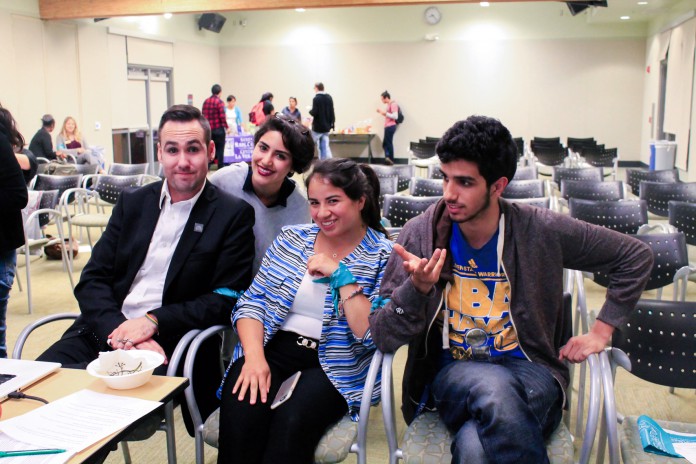
Gwendolyn Wu
Campus Beat Reporter
Students and faculty gathered at the Loma Pelona Center for a Title IX teach-in Monday night, addressing changes to the University of California’s sexual violence and harassment policy. Now UC SB, the student group that hosted the event, analyzed how the UC Sexual Violence and Sexual Harassment Policy was changed in January by revisions issued by the UC Office of the President.
Third-year sociology and Chican@ studies double major Alejandra Melgoza and first-year materials engineering Ph.D. student Jennifer Selvidge co-hosted the event, which consisted of a presentation informing participants of their rights under the law. The April 4 event kicked off National Sexual Assault Awareness Month.
The two also tackled how the university could provide alternative housing resources for sexual assault survivors, along with limited financial aid from the University of California, Santa Barbara’s Sexual Violence Survivor Fund, which is entirely supported by donors. Students can contact staff in Campus Advocacy, Resources & Education (CARE), Title IX, Counseling and Psychology Services (CAPS), Office of Judicial Affairs or Student Health to learn more about such resources.
Selvidge pointed out that it is mandatory for all schools receiving state and federal funding (money granted to a university so long as they comply with Title IX) to make an effort to end gender discrimination and sexual harassment on their campuses. According to Selvidge, Title IX requires universities give students proper, written notification about what resources are available on campus for them and have trained employees to work with students about sexual violence.
Throughout her presentation, Selvidge praised some Title IX requirements but remained critical of UC policies. One target of critique was the “Responsible Employee Clause” of UC policy, which states that any UC employee (including student workers but excluding those under a confidentiality clause, such as CARE advocates and offices of the Ombuds) must report incidents of sexual violence to the Title IX office upon hearing of them.
“That’s a problem because it encourages cultures of silence among student workers, especially among graduate students who are basically all student workers, and it prevents undergraduate students from talking to graduate students [about sexual assault],” Selvidge said. She claimed the clause may prevent students from confiding in friends employed by the UC, knowing that friend may be obligated to report the crime under the conditions of employment.
Members of Now UC SB have been known campus activists on the issue of sexual assault for over a year. Melgoza, who also serves as an off-campus senator within Associated Students, protested outside the Student Resource Building last April to contest what she perceived as a relaxed handling of her assailant’s punishment by UCSB officials.
Approximately 30 students held a 13-hour sit-in at Cheadle Hall last May, prompting Chancellor Henry Yang to meet with organizers — including Melgoza — to discuss protestors’ demands for changes to university judicial policy. Melgoza and fourth-year global studies and feminist studies double major Ashley Morgan also hosted a forum on sexual assault policy in October, which drew dozens of student and faculty participants.
As of last quarter, UCSB has committed to hosting a monthly open forum about sexual assault in room 1109 of the Counseling & Career Services building. Two more discussions are scheduled to take place on April 13 and May 11. While the group has not yet said what else is in store for National Sexual Assault Awareness Month, Selvidge and Melgoza hinted that more is to come.
“A lot of students have never heard of Title IX and don’t know that they have these protections, and that’s a problem,” Selvidge said to The Bottom Line. “Everyone on campus has these rights and it’s important that you know them. Arm yourself with knowledge before talking to the administrators.”










